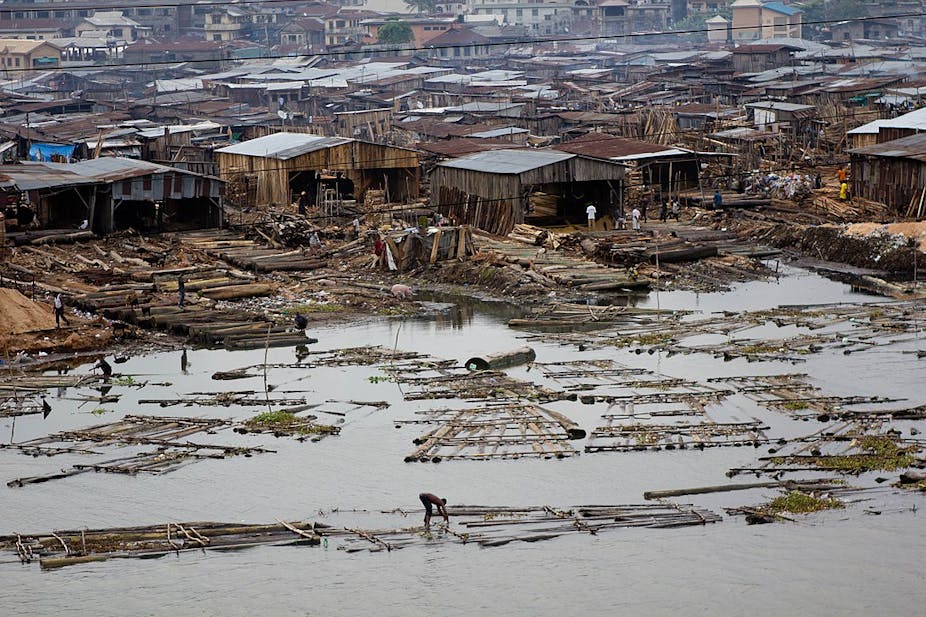
Africa is the world’s most rapidly urbanising region. By 2050 more than one billion people will live in cities across the continent.
Nigeria is Africa’s urban growth giant. In 1950, the West African nation’s urban population was under 375 000 spread across only 99 cities. Now there are close to 100 million people in over 780 cities.
Villages have mushroomed into large towns and small cities have expanded into giant metropolises. The population of Lagos, for example has swelled from under 300 000 in 1950 to over 11 million today. And that is only the official figure. Other estimates put the metro population closer to 21 million.
This rapid rate of urban population growth, fuelled by massive rural to urban migration, has overwhelmed public sector resources. It’s also hampered the private sector’s ability to provide either housing or jobs. As a result urban dwellers build their own accommodation and make their own economic fortunes. Most live in informal housing on the most marginal of lands.
They survive in poor environmental conditions and have limited access to public services like water, sewerage, police security, and fire protection. Infant mortality is high and residents battle with poor physical and mental health.
Informal employment is also precarious, subject to costs imposed by corruption and criminal gangs, often in poor working conditions and with uncertain incomes. Because the informal economy avoids taxation the government has little financial room for urban service provision.
But Nigeria is not the only country in the world that has a rapid urbanisation problem. Informal settlements house almost one billion people around the world. What can Nigeria learn from the experiments of others?
What to do
First, attempts to “eradicate slums”, dislodge communities, and “clean up” cities ultimately fail.
Sadly, these projects continue apace especially where informal communities sit on valuable land or on sites where major development are planned. In my book “The Unequal City: Urban Resurgence, Displacement and the Making of Inequality in Global Cities”, published in 2017, I discuss the negative impacts of slum eradication on cities as varied as Delhi and Manila. There “slum clearance” policies simply displaced people from central areas to distant peripheries often making the communities even more marginal in the process.
We now have better policies that focus on the improvement of existing communities rather than on their eradication.
Second, it is important to change the narrative. In reality, there is no easy distinction between the formal and informal sectors. They are inextricably linked. Describing informal communities as illegal or squatter settlements devalues them.
They are human beings just like everyone else. In fact, the makeshift urbanism of Nigeria, and the one billion people in informal cities around the world, is a testament to their resilience, innovation, sense of community, and positive outlook. They survive with little help from private markets or governments.
These communities represent huge reservoirs of hard work, self-reliance and a practice of sustainability. We need to build on their hard work. One way to do this could be by regularising the ownership of the land in informal settlements. This would provide the security people need to upgrade and improve their homes.
We could also make it easier for street vendors in the informal economy to have safe and secure places to conduct their business. The starting point is a recognition that the people in informal cities are the solution, not the problem.
Third, we should be wary of the big plans fronted by foreign aid donors, international agencies, and central governments. One study of a World Bank slum improvement project in Nigeria found that considerable funds were misdirected or wasted.
Smaller, local initiatives are better. They can involve residents in creating strategies and implementing plans. Policies need to be tailored and crafted for the needs of local communities, with ongoing and effective participation. There are numerous examples of similar schemes in Latin America, which has a longer tradition of rapid informal urbanisation.
Fourth, there is a huge infrastructure deficit in Nigeria’s informal settlements. The informal sector needs to be more effectively linked into the vital circuits of the city: fresh water supply, steady power, and the critical service provision of police, fire and medical services.
In Medellin, Colombia, for example, one strategy was to build efficient transport to link the informal settlements on the hillside to the low-lying central business district. Such schemes more tightly integrate the informal into the formal.
Finally, there is clearly a role for the private sector.
There are already private companies eager to invest in low cost housing. Improvements in technology make housing production much quicker and cheaper. We have the engineering technology to build a cheap, energy efficient, sustainable dwelling in little over two days. All low-income earners need are accessible housing finance mechanisms.
Going forward
A long-term commitment to turning informal settlements into liveable communities involves ensuring security, improving infrastructure, and creating strong links between informal and formal cities.
It also involves a commitment to participatory planning, an openness to policy experimentation, the realisation that one big plan cannot solve it all.
Informal settlements are not a temporary problem. They’re a vital part of global cities. There is no easy solution and no quick fix. We live in an urban world where turning the makeshift and the informal into the liveable and sustainable is our greatest challenge.![]()
John Rennie Short, Professor, School of Public Policy, University of Maryland, Baltimore County
This article is republished from The Conversation under a Creative Commons license.

